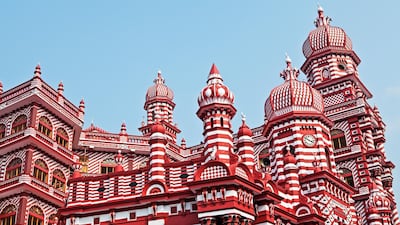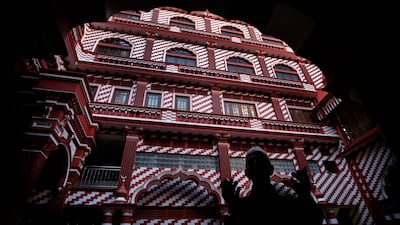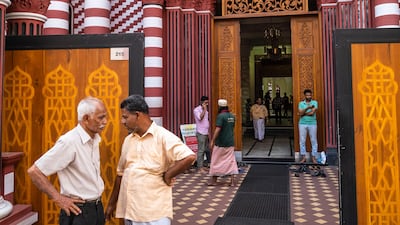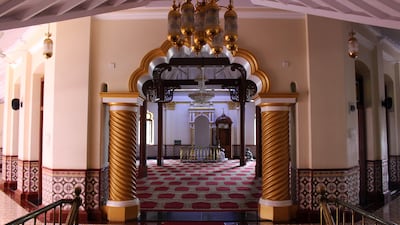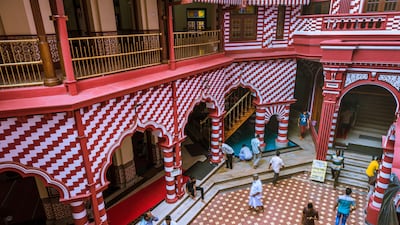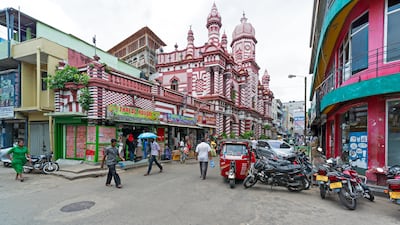The narrow streets of the Pettah market in Sri Lanka’s commercial capital of Colombo are almost unrecognisable right now. The once-pulsating economic centre near bursting to the seams with hawkers, shopkeepers, buyers and labourers now lies eerily silent, with store shutters drawn and the deserted roads giving off Wild West ghost town vibes, as a result of the country’s government-enforced Covid-19 lockdown.
The one reassuring constant is the call to prayer resounding from the speakers of the Jami Ul-Alfar Mosque on 2nd Cross Street.
Ask a local where you might find the Jami Ul-Alfar Mosque and you will most likely be met with a confused head scratch. Mention the Rathu Palliya (Sinhala for “red mosque”), on the other hand, and there will be instantaneous recognition. Also commonly referred to by its Tamil moniker Saman Kottu Palli (literally meaning mosque for Muslims of Indian origin), or more simply the Red Mosque, this long-standing monument has come to be accepted as part of the furniture in this bustling neighbourhood.
coordinator and tour guide of the Jami Ul-Alfar Mosque
The bright, peppermint-hued Indo-Saracenic and Neoclassical facade of the Jami Ul-Alfar Mosque – its name derives from the Arabic words for “congregation” and “success” – seems almost rebellious in comparison to its green-and-white counterparts across the country.
It is recognisable from afar, however, and has historically served as a reliable landmark for ships and seafarers approaching the Colombo port for more than a century.
“During the 1900s, when Sri Lanka – formerly Serendib – was under British colonial rule, South Indian Muslim traders were regulars at the country’s shores, and eventually set up their businesses and settled down for good,” explains Ruzni Maulavi, coordinator and tour guide of the mosque.
“With that came the need for an official place of worship to perform their obligatory prayers five times a day, and so, having purchased a plot of land, a trust was registered, architect HL Saibo Lebbe hired, and the mosque was designed and completed within the course of a year in 1909.”
Its unconventional yet striking colour scheme is said to have been inspired by the inside of the pomegranate. The five domes, too, were designed to take on the shape of the fruit. Each brick was painstakingly hand-painted with its unique striped, checkered, jagged and spiral variegations, and all 49 minarets stand guard over the restless marketplace, sporting crescents trained towards the direction of the Kaaba in Makkah.
From its humble beginnings as a two-storey structure with the capacity to house a mere 1,000 worshippers, the mosque has since undergone a much-called-for expansion and can now accommodate about 12,000 devotees at a time.
During the Friday prayers, however, even this often doesn’t seem nearly enough, with worshippers spilling out on to the streets, especially during Ramadan. During business days, pre-pandemic, the mosque recorded an average of 4,000 to 5,000 worshippers, and 400 to 500 tourists each day.
“We are the only mosque in Colombo to open our doors to tourists,” says Ruzni. “Out of the five entrances to the mosque, three are reserved for male worshippers, one for female devotees, and the other for tourists and visitors.
“We welcome people of all faiths into Jami Ul-Alfar, so it isn’t unusual to have non-Muslim Sri Lankans frequenting our mosque as well,” he explains. “They say they feel at peace here, and take great comfort in the sense of calm they are able to draw just from being inside the mosque.” That quietude is juxtaposed to the cacophonous bazaar outside the mosque’s doors.
On an average Friday afternoon, the more devout worshippers will arrive hours before the azan is called, eager to get closest to the elevated minbar from which the Imam will deliver his sermon; one that is often pertinent to the religious significance or sociopolitical climate of the time.

On entry, visitors take off their footwear and gain entrance to an expansive central courtyard housing the ablution "haudh" or pool. Only on looking up can one register the extent of the structure’s loftiness, and from the upper storeys, a view of the expansive Indian Ocean from the port will only confirm this sense of diminutiveness.
Back on the ground floor, unclad feet make their way from the cool Iranian-imported marble, to the plush, red Turkish carpets of the main prayer hall, passing underneath ornate chandeliers overhead.
This all harks back to a time before the pandemic, when the very idea of social distancing during prayer and a disinfection of the entire premises every few hours would have sounded far-fetched.
“This is the first time in the mosque’s 112-year history that our doors have had to be closed for worshippers,” says Ruzni. “In the beginning we remained open, following the capacity regulations mandated by the health authorities, but as the situation grew severe, we took proactive measures to ensure that our mosque community was safe.
“It has definitely been a challenging time. But unlike residential community mosques across the country, Jami Ul-Alfar primarily serves the businesspeople of one of Colombo’s busiest commercial districts, which means that if even one case of Covid-19 was confirmed from among our congregation, the net would be cast far wider than it would have for others.”
Even in the aftermath of the Easter Sunday attacks of 2019 – a string of suicide bombings that killed more than 250 people in and around Colombo – when Muslims were at their most vigilant, the mosque operated “business as usual”, save for the tourist section. This, too, eventually opened up once holidaymakers started trickling back into the country.
The global Covid-19 outbreak has had yet another damaging impact on Sri Lanka’s tourism sector, an industry that has played a decisive role in the island country’s economy. However, many would agree that a sure-fire sign of recovery would be a resuscitation of the streets of Pettah and the return of its reassuring din that almost drowns out the call to prayer of the Jami Ul-Alfar Mosque from its central standpoint.
At the heart of its function, primarily, the Red Mosque remains a place of worship for Muslims that frequent its prayer halls. Beyond that, it is also a unique design monument that leverages its palimpsestic nature to unite myriad ethnic and social demographics, contributing towards an inclusive Sri Lankan identity.
